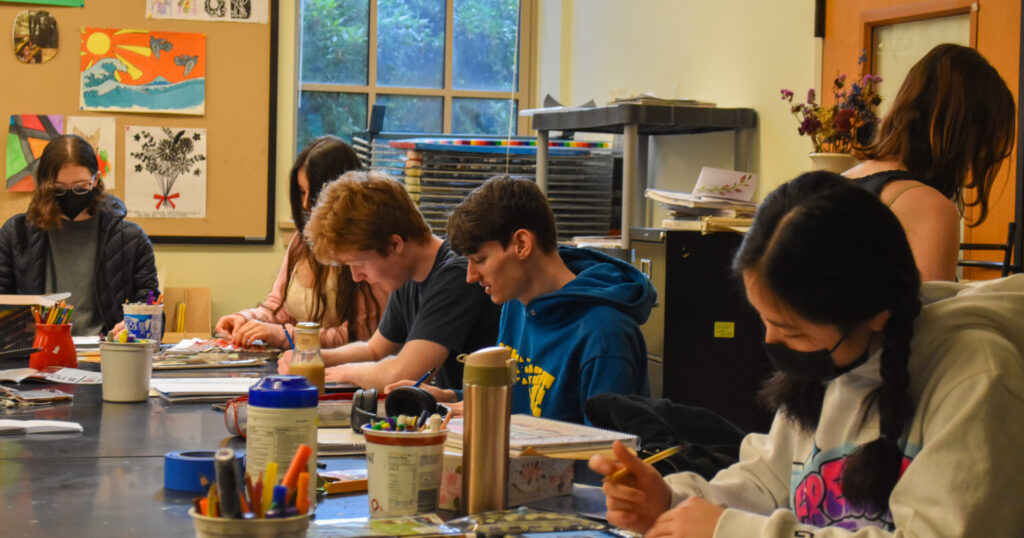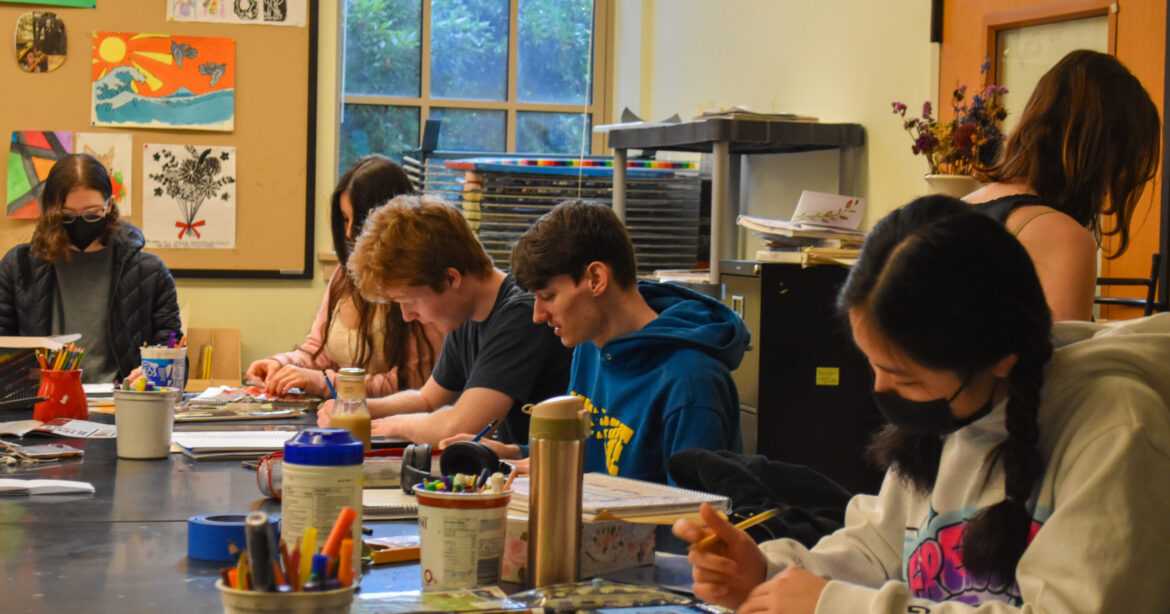Examining the social aspects of the DHH program at Roosevelt High School and external resources that cultivate community, solidarity

For centuries, Deaf individuals around the world have been finding and building community. These communities have made large strides in culture, art, innovation, leadership, science, human advancement, and more. They can provide valuable spaces for self-expression and mutual support.
Roosevelt High School is home to the only Seattle public high school program designated specifically for Deaf or Hard of Hearing students. Both within the program and in the greater Seattle area, the local Deaf community works to acknowledge, celebrate, and support Deaf individuals and Deaf culture.
Deaf culture is rich and complex. Even the way it’s referred to has significance. When referring to community, culture, or those who align themselves with the broader societal identity, the “D” in Deaf is capitalized. When deaf is spelled with a lowercase “d”, it refers specifically to the audiological condition itself. RHS student Priyna Chohan, ‘25, said, “There’s a big difference between a capital ‘D’ Deaf and then a lowercase ‘d’ deaf. Capital ‘D’ Deaf means like you’re involved in the Deaf community and you use ASL of any level, and lowercase ‘d’ deaf means that you are deaf, but you’re not involved in the culture and in the community.”
Further, not all people with impaired hearing refer to themselves in the same way. Some identify as hard of hearing, while others may identify as Deaf. Chohan noted, “Deaf means you have profound hearing loss, and it doesn’t matter when you get that hearing loss. Having profound hearing loss means you can hear basically nothing. If I don’t have my hearing aids, I can’t hear anything. But being hard of hearing basically means that you have lost some of your hearing and you may or may not use hearing aids.”
Deaf culture and community are defined in large part by the deafness of their members, according to Megan Jones in her Disability Studies Quarterly article,“Deafness as Culture: A Psychosocial Perspective”. She wrote, “An individual who cannot hear is potentially a member of a rich cultural heritage that separates the individual from any non-Deaf members of their family or community.”
While distinctions between capitalization or level of hearing loss may seem minimal to some, their significance is highly important within the Deaf community. Deaf rights advocate Eileen O’Banion writes that “When you are Deaf, you see the world in a different way. You communicate differently. You seek out others who are Deaf because they understand you. You don’t believe you have a disability—and you don’t want to be fixed.”
Deaf communities can provide a break for DHH people from the closed-minded perspectives certain hearing people may have about them. Examples include audism, the belief that those who can hear are superior, and oralism, using and supporting the oral method of teaching Deaf people to speak.
Chohan shared that she values the space provided by Roosevelt’s DHH program. “It’s definitely fun to be with other people that understand and empathize with my struggles,” she said. “I’d say that we’re pretty well known within Seattle although we’re kind of small.”
She said that the program “has enough connections to the point where we can [now] go to events, and we’re invited to events.” Members take part in experiences curated by various universities, such as Gallaudet University’s Academic Bowl, and events hosted by the Rochester Institute of Technology.
Chohan expressed that while the program is active, she would like to see more students like herself enrolled at Roosevelt. ”I do wish [the Roosevelt DHH community] was a little bigger, just so that we could have more ideas and minds. I’m right now the only [completely] deaf student here, but I’m able to relate somewhat to all the other people that are in our small little community. I’ve been trying to get some other Deaf students, incoming ninth graders, to come to Roosevelt.”
Chohan also noted that school is not the only place she or other students find Deaf community. “We definitely do get a lot of opportunities to express our culture, and not just at Roosevelt, but other places too.” The Seattle area is home to an array of organizations and services that provide support to DHH individuals and facilitate community.
The Hearing, Speech, and Deaf Center is a nonprofit that operates within the Greater Puget Sound area. They have offices in Seattle, Bellingham, and Tacoma that provide services related to audiology (the study of hearing and balance systems), communication, and early education. Through the HSDC, clients can find an interpreter or someone to help with medical, legal, and monetary issues.
Puget Sound Association of the Deaf hosts events to support Deaf, DeafBlind, and Hard of Hearing people. PSAD’s self-proclaimed mission is “to provide educational, historical, leadership, social and recreational programs that enhance the appreciation, culture, languages and understanding and well-being of diverse Deaf, DeafBlind and Hard of Hearing citizens of all ages contributing to the society over 120 years.”
There are also programs in the Seattle area that focus on uplifting DHH people in specific aspects of their life, like Deaf Spotlight. Deaf Spotlight is a nonprofit organization based in the arts. Online, they highlight their commitment to “supporting original and creative content about, for, and by Deaf, DeafBlind, DeafDisabled, and Hard of Hearing communities.”
They hold art exhibitions, have a BIPOC Deaf arts grant, and run the Seattle Deaf Film Festival. The organization also hosts an annual camp for 8 to 13-year-olds where “Deaf artists will provide a hands-on exploration of a rich variety of artistic mediums in a well-supervised and Deaf-friendly environment.”
Outside of school, Chohan participates in a DHH social group at Seattle Children’s Hospital. She says that it’s “a really, really big group of hard-of-hearing students and Deaf students, and I’m able to maintain a lot of friendships through there.”
She added, “I think that it’s also helpful because I am able to get advice from other Deaf and Hard of Hearing students who go through the same struggles as me. … The group definitely gives me the ability to just embrace my disability. Even though I’ve never really had a lot of insecurities coming with being Deaf growing up, I definitely think that that group definitely helped me feel more connected to my identity and my disability.”
Samson Abraham, a hard of hearing senior, looks to the future of Roosevelt’s DHH community saying, “Hopefully in the future we can have more DHH kids from other schools, you know, join [Roosevelt] and expand our club.”
Follow The Roosevelt News on Instagram @therhsnews. Questions, comments, or concerns? Contact the Editorial Board at therooseveltnews@gmail.com.
Your voice matters. Share your thoughts and experiences in the comment box below.
